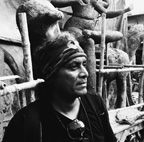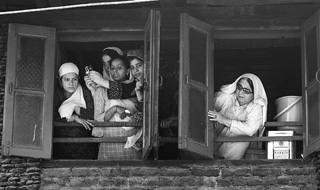Juror
Ranjan Palit
 [Juror’s Statement]
[Juror’s Statement]
A decade ago, I made a film called In Camera, in which I said that after shooting a hundred documentaries and filming the lives of others, with my daughter leaving home I felt that my life had passed me by: Wasn’t it time to tell my own story?
A decade later, my film Lord of the Orphans is going to be a fiction film, with one documentary moment, about the saga of the Palit family (my family) of Bajra in Chandannagar (then Chandernagore), a French colony in pre-independance India. It is the story of how our family has, for five generations, been affected by the curse of some brahmin priests who appropriated our land. The title of the film comes from my great grand-father, whose name Anath Nath, means “lord of the orphans.”
I feel that we are all really like orphans flitting around this world and slipping into the next—the nether world—becoming like ghosts, like in the Juan Rulfo novella, Pedro Paramour, and I also feel, as did Krzysztof Kieślowski, that our lives are interconnected; each strand, each path affects the next in this stasis in which we exist, where we feel like we are moving but we are actually standing still.
Today, I am trying to explore some of these things in my films, and to blur the lines between documentary and fiction.
Ranjan Palit has worked in cinema as a cinematographer, director, and producer for thirty-five years. As a cinematographer, he has shot over a hundred documentaries, including Bombay, Our City (dir. Anand Patwardhan); A Night of Prophecy (Amar Kanwar, YIDFF 2003); The Lightning Testimonies (also Amar Kanwar, YIDFF 2009); Jashn-E-Azadi (Sanjay Kak); For Maya (Vasudha Joshi, YIDFF ’99) and the six-hour CzechMate: In Search Of Jirí Menzel (Shivendra Singh Dungarpur). He has also shot fifteen narrative features, including Dreaming Lhasa, executive produced by Richard Gere, and Saat Khoon Maaf, directed by leading Bollywood director Vishal Bhardwaj; in addition to around 250 commercials. As a producer/director, he has made a dozen documentaries, including Forever Young (for BBC, YLE, and SBS Australia), In Camera (for PSBT India) and five shorts. He is currently editing his first feature film as director, cinematographer, and producer. Ranjan has won four National Film Awards (India)—returned three, in protest against right wing intolerance—two Golden Conches at the Mumbai International Film Festival, and several international awards: City of Freiburg, UNESCO Award, Munich, and Valais Award, Geneva. He has taught as a guest lecturer in film schools across India, and conducted masterclasses on cinematography and documentary filmmaking around the world, at places including Berkeley, Austin, Helsinki, Busan, Yogyakarta, and Taipei. He has been a juror at several Indian film festivals, and at Festival Film Dokumenter (FFD) Yogyakarta last December.
In Camera
 INDIA / 2010 / English, Bengali, Oriya, Kashmiri / Color / Blu-ray / 79 min
INDIA / 2010 / English, Bengali, Oriya, Kashmiri / Color / Blu-ray / 79 min
Director, Script, Photography, Narration: Ranjan Palit
Editing: Tarun Bhartiya
Sound: Surjo Deb
Producer: Rajiv Mehrotra
Production Company: Syncline Films
Source: Public Service Broadcasting Trust (Tulika Srivastava)
www.psbt.org
Palit, director of photography on numerous productions by independent documentary filmmakers Anand Patwardhan and Amar Kanwar that have also been screened at YIDFF, takes a look back at his twenty-five years of work behind the camera, accompanied by clips from some of his films. Revisiting and filming discreetly in various places he has known, images from the past and present mix—the boundary between the two remains ambiguous as time marches on all the same, and he even questions his own place in it all. With its personal viewpoint crossed with the voice of the street as well as with a passion for traditional culture, this work also stands as a contemporary history of Indian documentary film.
